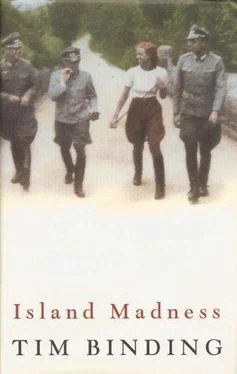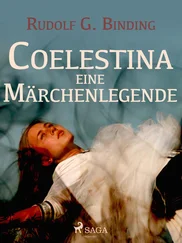“I am thinking of moving out of the Villa altogether,” he told her. “The Major has come completely undone. He is to be arrested.”
Veronica pulled her hand out.
“Arrested?”
The Captain leant over and gulped down another glass.
“I cannot tell you everything. You understand this, you are not like Molly, whose mouth is almost as wide as her—” He checked himself in time, but Veronica didn’t mind what he said about Molly, so long as it was uncomplimentary. “I have a story to tell. Listen.
That morning Bohde had come tiptoeing in with Major Ernst. The two of them were carrying three pictures which Bohde had decided to hang in the hall. Portraits. One of the Air Marshal of France—” an ugly looking bloke, “ Zep conceded, one of Albert Speer, and most importantly of all—he gulped the epithet—in celebration of His forthcoming birthday. The Commander-in Chiefs eyes, Ernst had pointed out, were like two bullets flashing from the muzzle of a gun. They decided to hang them in the corridor, where everyone might see them, on the bare wall facing the doors to the main rooms. They got a chair and some nails and after much banging and hammering and standing back, hung all three up, Speer on one side, the Air Marshal of France on the other and…in the middle. Zepernick smiled. He found the next part of his tale amusing. He took Veronica’s hand and placed it back beneath his shirt. With her other hand she unbuckled his belt. He moved once, raising his hips, then resumed his story.
As Ernst and Bohde stood back, admiring their handiwork, they suddenly realized that on the opposite wall, facing the three portraits, were two of Mrs Hallivand’s favourite paintings, which Lentsch had moved from the drawing room when first they arrived, pictures which were quite unfit to be placed opposite Albert Speer or the Air Marshal of France, let alone the leader of the German nation. Both of them featured girls of oriental disposition, with dark skin and slanting eyes, flaunting their nakedness by some Arabian watering hole. So Bohde called for Wedel and told him to take them down. Wedel was hesitant. More than his life was worth, he said. The Major was very particular about where those went. Whereupon Ernst flew into an almighty rage, Bohde dancing up and down the stairs egging him on. “Do you think that it is right that our leader should look upon these degenerate deformities?” he cried, and wrenched one of them off the wall, cracking the frame and the glass in the process. Bohde, rather chastened, told him to calm down and lifted the other off its hook. Together they carried them out into the coal shed. An hour later Lentsch returned for lunch, stomping through the French windows. Though he said he’d been out swimming his breath smelt as if he’d been drinking.
“This is a bad thing to do…” and here the Captain hesitated. “Things are happening here which need the utmost attention and discretion.” So he marched in and sat down to lunch. Bohde sidled into his chair, Ernst next to him. Not a word was spoken. Halfway through his soup the Major noticed the picture of Albert Speer staring at him through the open door. “Who put that up?” he demanded, and when Bohde told him that it was a gift from Major Ernst he threw down his napkin and said, “Well, I’m damned if I’m going to have his boss spying on me while I’m having dinner,” and got up to close the door, when he saw the other two. He stepped into the hall.
“Where are the Russell Flints?” he cries.
“The Flints?” Bohde tries to look innocent.
“The pictures!”
Zepernick waves his hands in the air. “He is screaming now.”
“I had them taken down,” Ernst tells him calmly. “They are not suitable.”
“Not suitable! Not suitable! Not suitable for that—“ and with that he marches back into the hall, takes each one off the wall and smashes them one by one against the wall. The Air Marshal, Albert Speer and lastly…” The Captain shook his head, hardly daring to give voice to the blasphemy. Veronica didn’t see the problem.
“Bit over the top, I grant you, but they’re only pictures.”
The Captain touched her cheek, saying, “You must understand, Veronica, that this picture is more valuable, more sacred than everything in this house. It would be the same if one day Mrs Hallivand came to church and found the vicar with a boy on the altar. Ernst was on the phone immediately. It is very bad for the Major, considering the circumstances.”
“What circumstances?”
The Captain ignored her question. He straightened up and poured himself another glass.
“So Ernst will move in soon, Bohde hanging on to his coat-tails. I will find a smaller place, of my own perhaps. However, before I go…” He looked at her closely. “I thought tonight you might like to accompany me to the Casino.”
“The Casino.” She felt her heart race.
“Yes, and afterwards, if things have quietened down, perhaps you would like to come back to the Villa. For a late supper and a nightcap.”
She could not believe it. He was asking her back to the Villa. She did not know what to do, whether to fling her arms around his neck or to appear calm and indifferent. She wanted to do both. She wanted to be calm and indifferent but she wanted to kiss him too! The Villa! Unable to resist, she leant across and kissed him, opening up the sweet tang of wine that ran loose in his mouth, pushing herself on top of him, struggling out of her blouse and brassiere, his lips travelling greedily down, sucking in great swollen mouthfuls of her as the boy intruded suddenly on her thoughts, irritating her, he has no right, this boy, to interfere with her in this way, why should she think of him when she had the Captain lapping hungrily at her breast. She had tried to persuade him to have a wash the other day, had lit the gas to her father’s fury and boiled kettle after kettle, dragging the tin bath close to the fire, rigging up the little curtain that she sheltered behind when Da was around, but when she had showed him he had recoiled, not from the prospect of soap and warm water but for the danger it could bring him. “The guards,” he said, pointing a finger to nis head, indicating thought, and then of course she understood. A clean boy would be noticed, a clean boy would be singled out and strung over the rafter he had told her about, where others have been beaten, the blood running down onto the floor until sometimes…he dropped his head. Did he mean pass out or die? It was unimaginable. It annoyed her sometimes the way he exaggerated his stories in order to gain sympathy, yet only the day she’d seen a foreign being kicked all in a heap by one of the Todt officials before being slung in the back of a lorry and left there all day. Horrible, simply horrible, but there were bound to be one or two sadists like that in every army, and there’s no knowing of course what the foreign might have done, and pushing over the loaf for the boy to cut it himself she began to question the wisdom of even feeding him, for there was colour coming back to his cheeks there was no doubt of it. Wouldn’t they notice that and wonder why? Beat the truth out of him. When he had gone she had stripped off herself and sat in the tepid water, scraping the sliver of soap under her arms, thinking how it would feel to wash the dirt from him, feeling the transformation as his rough patchy skin grew soft and glowing, the stink of his imprisonment replaced by the scent of perfumed soap, his clothes, shirt, trousers, jacket discarded and in their stead Victor Hugo’s silken dressing gown the Captain liked to wear.
She pulled Zepernick’s head away.
“You’ve picked a fine night to ask me, I must say,” she murmured, banishing the boy back to his hut. Oh, the Villa!
“Why, what is wrong?”
Читать дальше












